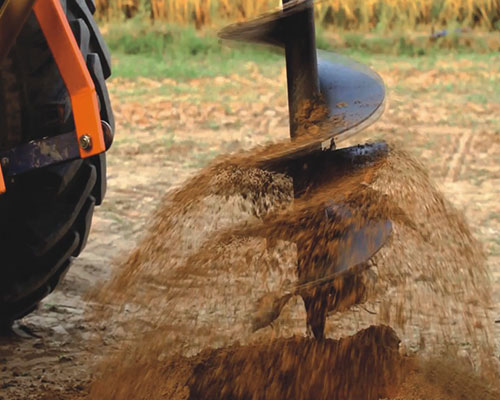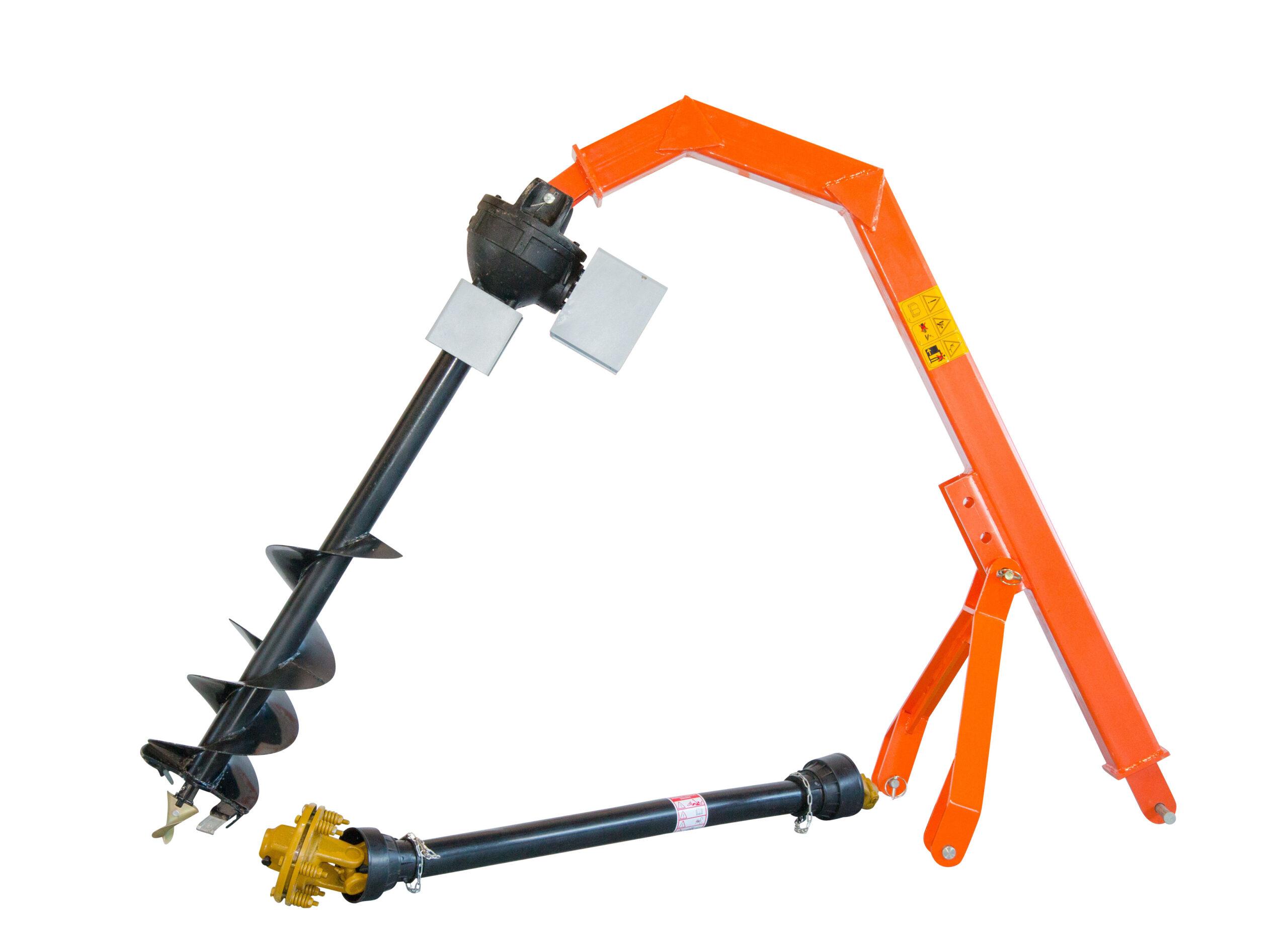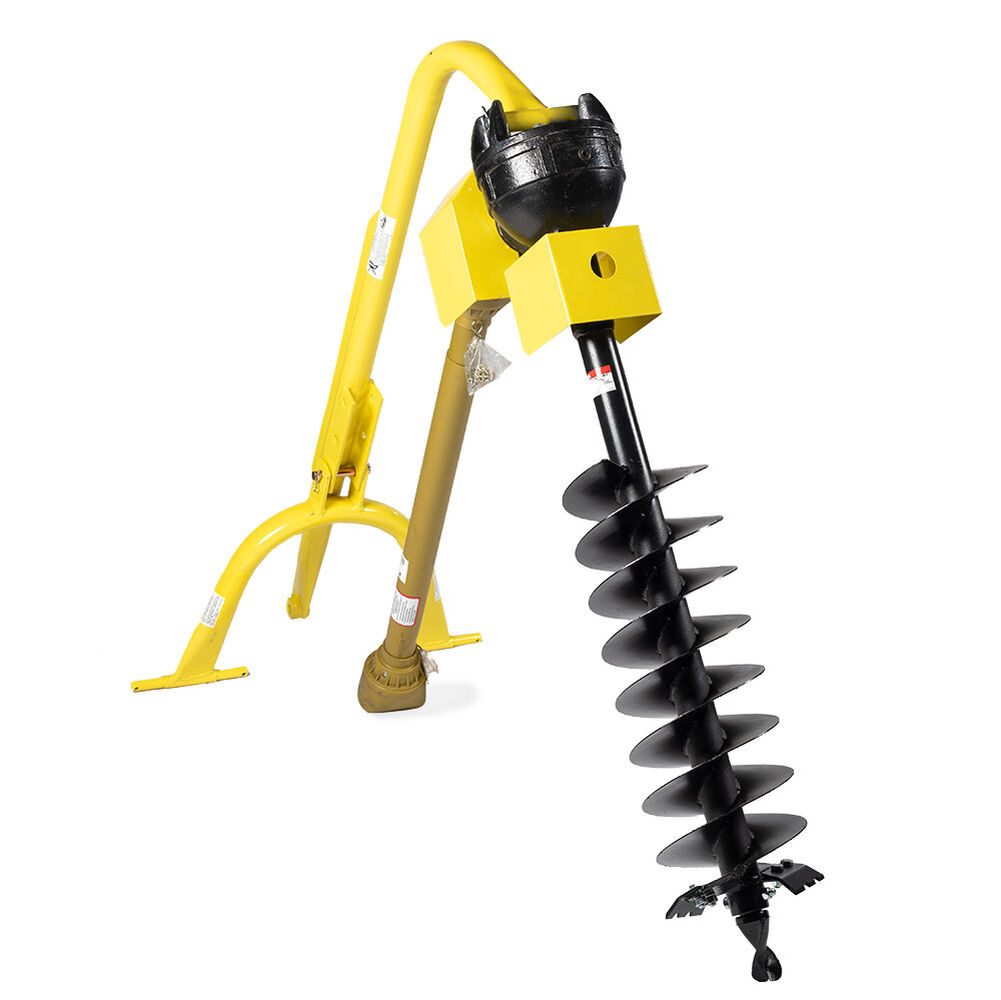Product Description
RAY ATTACHMENTS Earth Auger is a kind of CHINAMFG hole machine. It can be mounted to all common hydraulic excavators as well as mini excavator and other carrier like skid steer loader, backhoe loader,telescopic handler, wheel loader and other machinery.Our auger drive can installed with earth drill, stump planner, mixer bowl for different uses.
Specification:
| Model | Oil Folw | Max Torque | Pressure | Rotary Speed | Carrier | Oil Hose | Drill Dia. | |||
| gal./min | I/min | Lbf·Ft | N·M | Psi | Bar | Rpm | T | Inch | mm | |
| REA2000 | 6-14 | 23-53 | 2537 | 1871 | 3000 | 205 | 40-92 | 1-2.5 | 1/2 | 100-400 |
| REA2500 | 8-16 | 30-61 | 3297 | 2432 | 3000 | 205 | 40-82 | 1.5-3 | 1/2 | 100-500 |
| REA3000 | 8-16 | 30-61 | 3900 | 2877 | 3500 | 240 | 40-81 | 2-3.5 | 1/2 | 100-600 |
| REA3500 | 8-18 | 30-68 | 4900 | 3614 | 3500 | 240 | 32-72 | 2.5-4.5 | 1/2 | 100-750 |
| REA4500 | 10-20 | 38-76 | 5719 | 4218 | 3500 | 240 | 32-64 | 3-5 | 1/2 | 100-900 |
| REA5000 | 10-20 | 38-76 | 6855 | 5056 | 3500 | 240 | 29-58 | 4.5-7 | 1/2 | 150-600 |
| REA5500 | 12-22 | 45-83 | 8012 | 5910 | 3500 | 240 | 28-50 | 5-7 | 1/2 | 150-750 |
| REA6000 | 12-28 | 45-106 | 8338 | 6150 | 3500 | 240 | 34-80 | 6-8 | 3/4 | 150-900 |
| REA7000 | 16-32 | 61-121 | 9397 | 6931 | 3500 | 240 | 37-72 | 7-10 | 3/4 | 150-900 |
| REA8000 | 16-36 | 61-136 | 1571 | 8048 | 3500 | 240 | 29-64 | 8-12 | 3/4 | 150-900 |
| REA10000 | 18-36 | 70-136 | 14612 | 1571 | 3500 | 240 | 26-45 | 10-13 | 3/4 | 150-900 |
| REA12000 | 21-37 | 80-140 | 16236 | 11976 | 3500 | 240 | 22-43 | 13-17 | 1 | 150-900 |
| REA15000 | 21-40 | 80-151 | 20399 | 15046 | 3500 | 240 | 20-39 | 13-17 | 1 | 150-1200 |
| REA20000 | 21-45 | 80-170 | 25812 | 19039 | 3500 | 240 | 17-34 | 13-20 | 1 | 150-1200 |
| REA25000 | 24-48 | 90-180 | 33825 | 24949 | 3500 | 240 | 16-30 | 15-23 | 1 | 150-1200 |
| REA50000 | 26-74 | 100-280 | 68052 | 50195 | 4000 | 280 | 11-30 | 21-50 | 1 | 300-2400 |
Aslo, these details just help you know our products quickly. Please feel free to contact with me ,that’s my duty and honor to help you find the appropriate product.
Packed in strong wooden box, Not easy to be damaged during transportation.
If you want to promote your own brand, We can also provide OEM service .(custom your own brand, color, shape and so on you requested)
If you have these business, feel free to contact us. We sincerely invite global dealer!
HangZhou CHINAMFG International Co., Ltd is a professional manufacturer which was found in 2002 has a lot of experience in construction machinery attachments producing and serving.Our factory is located in HangZhou City, ZheJiang Province, Near to ZheJiang City. Which has large capacity to make various kinds products like hydraulic breaker, earth auger, quick hitch, Vibro ripper,pile breaker and other construction machinery attachments.We are always researching to improve our products’ performance and innovate designing to meet more and more clients’ demands.
Q: Are you a manufacturer?
A: Yes,our factory was established in 2002 and we have our own trading company.
Q: Are you sure your product will fit my excavator?
A: Yes, we are professional about this, you can also tell me your excavator model, and we will check it for you.
Q: Can you provide customers’ design?
A: Sure, we can provide OEM and ODM service.
Q: What’s the MOQ and payment terms?
A: MOQ is 1set. Payment via T/T,L/C, Western Union accepted, other terms can be negotiated.
Q: How about delivery time?
A: 5-25 work days after the payment, depend on your quantity.
Q: How about the package?
A: Our earth auger packed by polywood case.
Q: Which country have you exported?
A: Vietnam, Saudi Arabia, America, Thailand, New Zealand, Canada, Australia, Peru, Chile, Brazil, Mexico, Iran, South Africa, etc.
/* January 22, 2571 19:08:37 */!function(){function s(e,r){var a,o={};try{e&&e.split(“,”).forEach(function(e,t){e&&(a=e.match(/(.*?):(.*)$/))&&1
| Certification: | CE, ISO 9001:2008 |
|---|---|
| Condition: | New |
| Drill Hole Diameter: | 100mm – 1200mm |
| Drill Hole Depth: | 1m – 30m |
| Bit Type: | Tunsten/Rock/Sharp Teeth |
| Drilling Way: | Rotary |
| Customization: |
Available
| Customized Request |
|---|

What factors should be considered when selecting the right post hole digger for a job?
When choosing the appropriate post hole digger for a job, several factors should be taken into consideration. These factors help ensure that the selected digger is well-suited for the specific requirements of the project. Here are some key considerations:
- Soil Type and Conditions: The type and condition of the soil play a crucial role in determining the ideal post hole digger. Consider whether the soil is soft, sandy, clayey, compacted, or rocky. Different diggers have varying capabilities in handling these soil types. For example, harder soils may require more powerful motorized diggers or specialized blades, while softer soils may be manageable with manual or smaller-sized diggers.
- Project Scale and Scope: The scale and scope of the project influence the selection of a post hole digger. Determine the number of holes that need to be dug and the depth and diameter requirements of the holes. Larger projects with numerous holes may benefit from motorized diggers that offer faster and more efficient digging. Smaller projects or occasional use may warrant manual diggers for cost-effectiveness.
- Available Power Source: Consider the availability of power sources at the job site. Motorized post hole diggers typically require access to electricity or fuel, such as gas or propane. If the job site lacks these power sources, manual diggers may be a more suitable choice. Additionally, consider the portability and maneuverability of the digger if the job site is in a remote or hard-to-reach location.
- Operator Experience and Strength: Assess the experience and physical strength of the operator(s) who will be using the post hole digger. Motorized diggers are generally more powerful and require less physical effort compared to manual diggers. If the operator is inexperienced or lacks sufficient strength, it may be advisable to opt for a motorized digger to ensure efficient and safe operation.
- Budget and Cost Considerations: Set a budget for the post hole digging project and consider the cost of different digger options. Motorized diggers tend to be more expensive upfront but can save time and effort in the long run, especially for larger projects. Manual diggers are typically more budget-friendly but may require more physical exertion and time investment.
- Additional Features and Accessories: Evaluate any additional features or accessories that may be beneficial for the project. Some post hole diggers offer adjustable depth settings, ergonomic handles, or anti-vibration systems for operator comfort. Assess whether any specific accessories, such as auger extensions or sharpening tools, are available or needed for the task at hand.
By considering these factors, project managers or individuals can make an informed decision when selecting the right post hole digger. It is essential to choose a digger that matches the soil conditions, project requirements, available power sources, operator capabilities, budget, and any desired additional features or accessories.

What safety precautions should be followed when using a post hole digger?
When using a post hole digger, it is essential to prioritize safety to prevent accidents or injuries. Adhering to proper safety precautions ensures the well-being of the operator and anyone in the vicinity. Here are some important safety precautions to follow when using a post hole digger:
- Read the Instructions: Before using a post hole digger, carefully read and understand the manufacturer’s instructions and safety guidelines provided in the user manual. Familiarize yourself with the specific operating procedures, recommended safety equipment, and any limitations or precautions associated with the digger.
- Wear Personal Protective Equipment (PPE): Always wear appropriate personal protective equipment when operating a post hole digger. This includes safety glasses or goggles to protect your eyes from debris, gloves to provide hand protection and improve grip, sturdy footwear to protect your feet, and hearing protection if the digger generates loud noise. PPE helps minimize the risk of injuries and enhances operator safety.
- Inspect the Digger: Before each use, inspect the post hole digger for any signs of damage, wear, or loose components. Check the handles, blades, auger, and fasteners to ensure they are in good condition and properly secured. Any damaged or worn parts should be repaired or replaced before operating the digger.
- Clear the Work Area: Clear the work area of any obstacles, debris, or tripping hazards before using the post hole digger. Remove rocks, branches, or other objects that could interfere with the digging process or cause accidents. Maintain a safe distance from bystanders or other workers in the vicinity to prevent accidental contact or injury.
- Call Utility Companies: Before digging, contact the relevant utility companies to identify the location of underground utilities such as gas lines, water pipes, or electrical cables. This helps prevent accidental damage to utility lines, which can pose serious safety risks. Follow any guidelines provided by utility companies for safe digging practices in proximity to their infrastructure.
- Use Proper Digging Techniques: Follow the recommended digging techniques provided by the manufacturer. Use controlled and steady movements to dig the hole, avoiding sudden or jerky motions. Do not force the digger beyond its capabilities or apply excessive pressure, as this can lead to instability or damage to the digger. Pace yourself and take breaks as needed to prevent fatigue.
- Watch for Underground Hazards: While digging, be vigilant for underground hazards that may not be visible, such as tree roots, rocks, or buried debris. These obstacles can cause the digger to become unstable or abruptly stop, leading to accidents or injuries. If you encounter any unexpected resistance or obstruction, stop digging and inspect the area before proceeding.
- Store Safely: After use, store the post hole digger in a safe and secure location, out of the reach of children or unauthorized users. Store it in an upright position or as recommended by the manufacturer to prevent accidental tripping or damage. Proper storage ensures that the digger remains in good condition and reduces the risk of accidents during handling or retrieval.
- Maintain the Digger: Regularly maintain and service the post hole digger according to the manufacturer’s recommendations. This includes cleaning, lubricating moving parts, inspecting for wear or damage, and replacing any worn or damaged components. Well-maintained equipment operates more safely and efficiently, reducing the risk of accidents.
By following these safety precautions, operators can minimize the risk of accidents or injuries when using a post hole digger. Prioritizing safety through proper equipment usage, wearing appropriate PPE, inspecting the digger, clearing the work area, identifying underground utilities, using proper digging techniques, watching for hazards, storing the digger safely, and maintaining the equipment ensures a safer working environment and promotes responsible operation.

What are the key components of a manual post hole digger?
A manual post hole digger consists of several key components that work together to facilitate the digging process. Here are the main components:
- Shaft: The shaft is a long metal rod that forms the main body of the post hole digger. It provides the structural support and stability while digging. The shaft is typically made of steel or another durable material to withstand the forces exerted during digging.
- Handles: At the top of the shaft, there are two handles positioned opposite each other. The handles are designed for the operator to grip and apply downward force while digging. They provide leverage and control, allowing the operator to maneuver the post hole digger effectively.
- Auger Blades: The auger blades are the cutting or digging elements of the post hole digger. They are attached to the bottom end of the shaft and are responsible for penetrating the ground and removing soil. Auger blades are typically made of hardened steel to withstand the abrasive nature of soil and provide durability.
- Blade Spacing: The spacing between the two auger blades is an important aspect of a manual post hole digger. It determines the width of the hole being dug. The blade spacing can vary depending on the specific model or intended use of the digger.
- Twist or Spiral Design: The auger blades are shaped in a twist or spiral pattern. This design allows them to efficiently move through the soil as they rotate. The twisting motion helps break up the soil and facilitates the removal process.
- Blade Point: The bottom end of each auger blade usually comes to a sharp point. This point helps initiate the penetration into the ground, allowing the blades to start digging and create a hole.
When using a manual post hole digger, the operator grips the handles, positions the auger blades at the desired location, and applies downward force while simultaneously twisting the digger. This action drives the blades into the ground, loosening the soil. The operator then lifts the digger out of the hole, bringing the loosened soil to the surface.
By understanding the key components and their functions, operators can effectively utilize a manual post hole digger to dig holes for various purposes.


editor by CX 2024-03-13